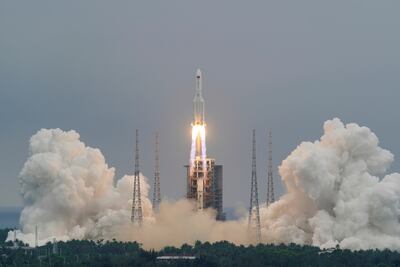Debris from a Chinese rocket is set to crash to Earth some time over the next few days, with the potential for wreckage to land across a wide section of the globe.
Part of the Long March 5B rocket launched by China on Sunday will make an uncontrolled re-entry around July 31, says The Aerospace Corporation, a non-profit group in El Segundo, California that receives US funding.
Parts of the US, Africa, Australia, Brazil, India and South-east Asia could be hit by debris, according to Aerospace predictions.
China has dismissed concerns over the rocket’s re-entry and the potential fallout. Its state-backed media has described such warnings as “sour grapes” from people resentful of the country’s rise as a space superpower.
“The US is running out of ways to stop China’s development in the aerospace sector, so smears and defamation became the only things left for it,” the Global Times newspaper reported, citing Song Zhongping, a television commentator who closely follows China’s space programme.
“The US and Western media deliberately exaggerate the ‘loss-of-control’ of the Chinese rocket debris and the probability of personal injury caused by the rocket debris, obviously with bad intentions,” Shanghai-based news site Guancha.cn said.
The descent of the 23-tonne booster is part of what critics say is a string of uncontrolled crashes that highlights the recklessness of China’s escalating space race with the US.

“Due to the uncontrolled nature of its descent, there is a non-zero probability of the surviving debris landing in a populated area — over 88 per cent of the world’s population lives under the re-entry’s potential debris footprint,” Aerospace said Tuesday.
In May 2021, pieces of another Long March rocket landed in the Indian Ocean, prompting concern that the Chinese space agency had lost control of it.
“It is clear that China is failing to meet responsible standards regarding their space debris,” Nasa Administrator Bill Nelson said that month. “It is critical that China and all space-faring nations and commercial entities act responsibly and transparently in space to ensure the safety, stability, security and long-term sustainability of outer space activities.”
China’s most recent launch, which sent a module to the nation’s space station, included a booster to put the spacecraft into orbit. That booster is now “dead” and beyond the control of the Chinese space agency, said Jonathan McDowell of the Centre for Astrophysics, which is operated by Harvard University and the Smithsonian Institution.
“The Chinese are right that the best bet is that it will fall in the ocean,” he said, although “there are plenty of populated areas” within the rocket booster’s range.
More debris may fall to Earth later this year, when China will be launching another Long March rocket to the space station, Mr McDowell said.

